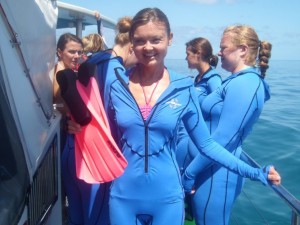The warm tropical waters bring many welcome visitors to Far North Queensland during the summer months from November to May. Tourists looking to experience the Great Barrier Reef, the Wet Tropics Rainforest, and the Tablelands flock to Cairns and the surrounding areas, and are welcomed enthusiastically by tourism and hospitality staff and locals alike. However there are some visitors to the region during these months that everyone—tourism staff, locals and tourists—are very wary of: Marine stingers. Marine stinger season generally runs from the first day of November through to late May or early June. There are three main categories of stingers that tourism staff and surf lifesavers try to make locals and visitors aware of: Blue bottles, Irukandji, and box jellyfish. While stings are fairly uncommon, the presence of these creatures in the water creates the need for some education on behalf of tourism staff, so that visitors can enter the water and have the highest levels of safety. In this post, we’ll examine the first of three categories of stingers and provide some basic tips and first aid to keep you safe.
Bluebottle:
Likelihood of being stung: Low
Danger of sting: Extremely low
The bluebottle (Physalia utriculus) is Australia’s most common stinging jellyfish, and is found at reef locations around Cairns during the summer months. The sting causes immediate pain which, while not life threatening, can last more than an hour. First aid for a blue bottle sting involves carefully removing any remaining tentacles by gently washing the area in sea water and carefully picking them off, taking care to avoid further stings, preferably by wearing gloves. Those administering first aid can then immerse the area in hot water (45 degrees Celsius – no hotter than the person can comfortably tolerate) for at least 20 minutes. Vinegar is not recommended for bluebottle stings, however the presence of other marine stingers in the area can make identification of the sting difficult; in these cases, vinegar should be used as it is the preferred treatment for other types of stings—if you are not sure it is a bluebottle sting, use vinegar.
It is important to remember that the likelihood of being stung is extremely low. Stingers of all types usually only occur during certain weather conditions, such as northerly winds and during certain phases of the moon. The good news is, you don’t need to be an expert to stay safe. When booking a trip to the reef, or visiting beaches around Cairns, ask your booking agent or tourism staff if marine stingers such as blue bottles have been spotted in the water. Most reef operators will also have the option to wear stinger suits.
Stinger suits, also known as sunsuits, these full-body suits cover 99% of the swimmer’s body, and include covering for the hands, as well as a hood to protect the neck ears and forehead. Combined with a snorkelling mask and fins, there is virtually no exposed skin that can come in contact with a stinging tentacle. These suits have the added bonus of having an SPF (Sun Protection Factor) of 50, meaning they keep out 98 percent of UVB radiation. These suits keep the wearer from getting sunburned, and also keep chemical sunscreens out of the water, which have been shown to damage corals and marine wildlife. These suits are typically for hire on trips to the reef, and will typically cost $5-$10 to hire for the day. This charge is usually to offset the cost of the operator buying new suits and cleaning current ones. If you are a Cairns local, or are going to be doing quite a bit of swimming in coastal and reef waters, it may be worth venturing into a dive shop and purchasing your own suit.
So as you journey out to the Great Barrier Reef, remember that the likelihood of being injured by any marine wildlife is extremely low; indeed the most dangerous aspect of any reef trip is too much unprotected exposure to the sun. So now that you have some basic information on the bluebottle jellyfish, feel free to grab your gear, head into the water, and enjoy the reef!

